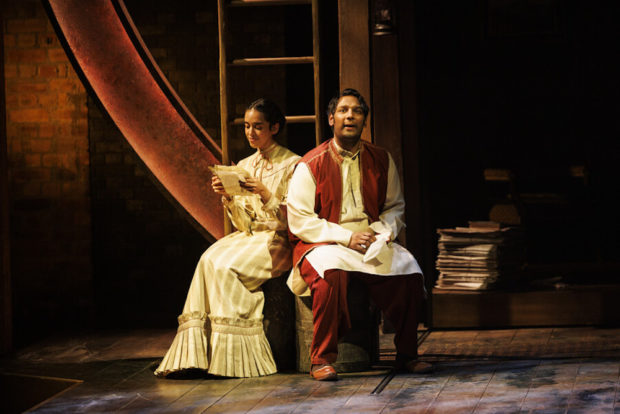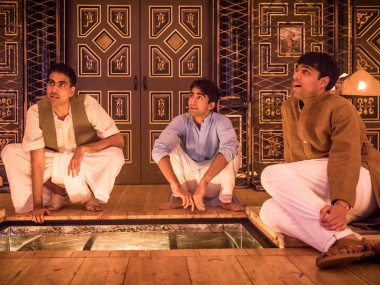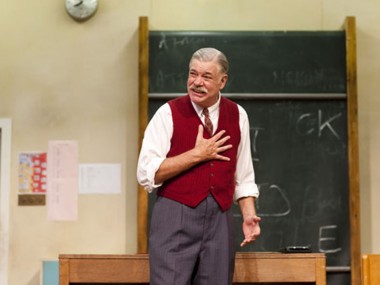The Empress, Lyric Hammersmith
Thursday 12th October 2023

Anniversaries are great moments for reassessment. Ten years ago, the Royal Shakespeare Company (RSC) first staged Tanika Gupta’s enjoyably epic history play, The Empress, about Indians in Victorian London, directed by Emma Rice. Since then the text has become a favourite for secondary schools at GCSE and A level, and now the drama is being revived by the RSC, this time directed by Pooja Ghai, and — unlike its original production — visiting London, thanks to the Lyric Hammersmith. With some scenes slightly rewritten, the improved version comes across as both fresh and relevant.
The play, which runs at nearly three hours, is a panoramic endeavour with three distinct story lines: the first is the tale of Rani, a 16-year-old Indian ayah (nanny) who has been brought over from the Raj by an English family, looking after their children on the long voyage, only to be summarily dismissed when they arrive in England. Her experience is vividly portrayed: utterly alone in London, staying at rat-infested lodgings, then working for a English family where the husband — a former resident of India — is abusive, before ending up at a boarding house for distressed ayahs and finally as a secretary to Indian nationalists in the Empire’s metropolis.
The second story is that of Queen Victoria, who in 1887 received a human being — Abdul Karim — as a gift on her Golden Jubilee, and grew to admire him first as a servant and then as her Munshi, or teacher. Although his closeness to the queen created tensions with other members of the royal household, she remained loyal to him, even though she sometimes had to bend to the will of the more racist courtiers. Karim is dignified, charming and restrained, and then becomes more demanding of gifts and honors, which results in further tensions. As history records, after Victoria dies in 1901, he is ignominiously stripped of his possessions, and her letters to him are burnt.
The final story is that of political Indians in the capital, and of the early stirrings of the movement for independence. Gupta shows how Dadabhai Naoroji, Britain’s first Indian Member of Parliament, fights for election, and how he also meets a younger generation — namely Gandhi and Jinnah — as they visit London to train as lawyers. These sketches of the politics of protest remind us that the struggle for independence was a long one, and had many different fronts. There’s also something very beautiful about Gupta’s evocation of an Indian presence at every level of British society, from monarchy and aristocracy, through the professional middle-class, to bohemians and the working class.
The playwright’s representation of Victoria, proud of Empire but irritated by casual racism, suggests an agreeably conflicted character, and certainly one who holds our attention. But while the scenes between the crown and Karim, which include a racist lady-in-waiting, Lady Sarah, reflect on the status and significance of the Empire’s Empress, the other main narrative, which is Rani’s story, shows a contrasting empress, one of humble origins, but having great resourcefulness. If the love affair between her and Hari, a lascar working on the great ships that sailed between continents, is fragmented by events, their reunion is a touching one.
In fact, Rani’s story has a powerful emotional core, and several of its episodes are moving. Her initial teaching of Hari to read is quietly full of feeling. Gupta is also good at including humorous incongruities in her dramaturgy so that painful episodes are contrasted with lighter ones. Characters such as the warmhearted working-class women, Lascar Sally and Firoza, offer sharp insights into the injustices of Victorian society in down-to-earth language. The baddies, such as the violent Serang (overseer) or the abusive Lord John Oakham, are aptly ugly characters, while Naoroji dominates the second half of the evening with his philanthropy and political ideas.
Gupta has previously, in her 2017 play Lions and Tigers, explored the battle for independence, focusing on the more violent Bengali radicals of the early 1930s, reminding us that Gandhi’s non-violent tactics were not the only story. After all, the struggle for self-government in Victorian times included the 1857 Rebellion (know to the Brits as the Indian Mutiny), and it’s good to see how such epic movements which aim for human dignity included lascar strike actions (however unsuccessful) as well as the development of the intellects and characters of young lawyers. In fact, Gupta’s short monologue The Overseas Student explores Gandhi’s time in London more fully than is possible in The Empress.
Given the large cast, and many incidents, Ghai’s production has a remarkable clarity and her stage pictures, helped by Rosa Maggiora’s wonderful design of a huge O and multi-level platforms, are often lovely to look at. And her cast do her proud: Tanya Katyal’s Rani is a real joy — effervescent, energetic, sometimes downhearted but never defeated; Aaron Gill’s Hari mixes boisterousness with growing tenderness; Alexandra Gilbreath gives Victoria chuckles as well as severity; Raj Bajaj’s Karim is both arrogant and generous; and Simon Rivers’s Naoroji combines idealism with pragmatism. With its climactic joyous scenes of “India in London”, song sequences, and strong emotional coherence, this is a most moving account of race and Empire.
This review first appeared on The Theatre Times




